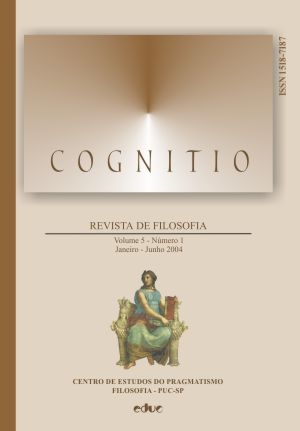Beyond Absolute Pragmatism: the Concept of Community in Josiah Royce’s Mature Philosophy
Keywords:
Royce, Community, PragmatismAbstract
In many accounts of the history of classical American philosophy, the Harvard philosopher Josiah Royce — younger colleague and friend of William James, and one of Charles Sanders Peirce’s interlocutors — is categorized as America’s last absolute idealist: he is thus seen not as a pragmatist, but as a philosopher whose (somewhat outlandish) Hegelianism has, always already, been on the verge of being replaced by the newly emerging Jamesian pragmatism.This picture of Royce has serious flaws (as, i.e., KUKLICK [1985], and OPPENHEIM [2001], have shown). Royce, the absolute idealist, did start his intellectual career (as he says in his Presidential Address at the American Philosophical Association of 1903) as a very pure pragmatist (1); and he remained influenced — during all his philosophical exchanges with William James over the absolute — by pragmatist motifs to such an extent that he called his idealist position, interchangeably, absolute pragmatism (2). In his latest philosophy (The Problem of Christianity, 1913), it is particularly Royce’s engagement with Charles Sanders Peirce’s signs theory by which he re-structures this continuing interest in pragmatism/pragmaticism. The leading concept at this stage of his thought — Royce’s notion of interpretation, which he explicates in the idea of a community of investigators [and, in ethic-theological terms, in a Pauline concept of church] — attempts to re-incorporate, in new and sophisticated ways, core elements of (classical) pragmatism, while avoiding some of the shortcomings of James’s individualist (and also of Peirce’s science-bound pragmaticist) position. In this paper I will show how Royce, during the three phases of his intellectual development, deploys various arguments at the margins of (classical) pragmatism. Royce, on the one hand, is constantly fascinated by the non-foundationalist, pragmatist project (especially in its logical, Peircean form); on the other, he keeps distance from (some versions of) this project, and positions himself carefully as a well informed critic of (primarily James’s form of) pragmatism. This ambiguity makes the study of Royce fascinating (especially today since the most recent neopragmatist discourse starts to re-investigate the intricate relation between pragmatist claims and Hegel [BRANDOM, 2000; RORTY, 2001). To carefully read Royce’s mature philosophy, is thus not a mere exercise in history of philosophy.My paper will consist of two parts. In segment one, I will shortly sketch the three formative stages of Royce’s intellectual path: his early pragmatism (1.1), his absolute pragmatism (1.2) and his mature focus on interpretation/ community (1.3); while doing this, I will also point out in which ways Royce’s leading concepts differ, f.i., from William James’s form of pragmatism and from (aspects of ) Peirce’s pragmaticist notion of truth. Part 2 of my presentation will focus on Royce’s concept of community, which is the core notion of his mature pragmatism. This concept has epistemological bearings; but it is also, re-conceptualized as the notion of Interpreter-Spirit, ultimately tied to the idea of a Universal Community, a notion which Royce elucidates more closely in his philosophy of religion. My paper will deal with Royce’s theory of social interpretation in two respects. In (2.1) I will argue that Royce’s notion of a Community of Investigation (which — in some regards — is more elaborate than comparable ideas in Peirce) is crucial, if pragmatism wants to stay clear of reductionist (diadic) self-images. (I will thereby build on, and extend, an argument, that, in part, was presented by K.-O. Apel). And, in (2.2), I will compare Royce’s concept of community with related notions in the work of two philosophical authors that Royce, ambivalently, courted: with Kant’s idea of a Kingdom of Ends; and with Hegel’s concept of Gemeinde (in his Lectures on the Philosophy of Religion, Part III, The Consummate Religion, Community, Spirit). As will be shown, Royce’s mature pragmatism/idealism — while keeping away from all transcendental and absolute dialectical claims — incorporates essential thoughts from these two authors: thoughts that can be used in order to critically re-assess, and differentiate, narrower versions of pragmatism.Metrics
Metrics Loading ...
Downloads
Published
2013-01-04
How to Cite
Nagl, L. (2013). Beyond Absolute Pragmatism: the Concept of Community in Josiah Royce’s Mature Philosophy. Cognitio: Revista De Filosofia, 5(1), 44–74. Retrieved from https://revistas.pucsp.br/index.php/cognitiofilosofia/article/view/13208
Issue
Section
Cognitio Papers









